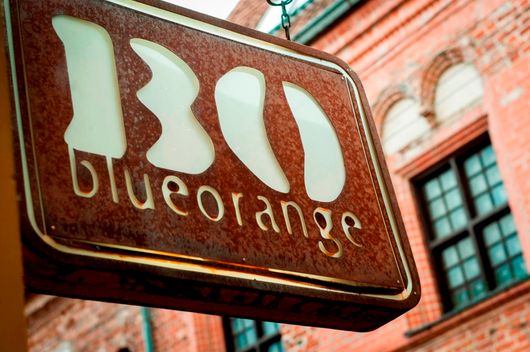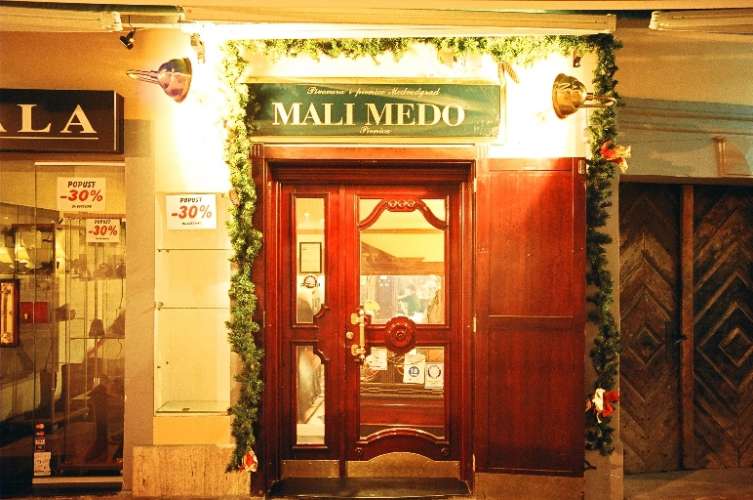back to Lithuania
Muitinės g. 9, Kaunas 44280, Lithuania
Website: www.blueorange.lt
- Quality and/or choice of drinks – 7/10
- Style and Decor – 7/10
- Character, Atmosphere and/or Local Life – 9/10
- Amenities & Events – 8/10
- Value for Money – 9/10
- The Pub-Going Factor – 8/10
Blue Orange, or B.O for short (…lol!) is undoubtedly Kaunas’ foremost long-standing social drinking institution for students and young folk, taking on an unofficial Student Union bar feel, with a few bells and whistles that entice a post-Uni crowd as well.
The name was inspired by the poem The World Is Blue As An Orange by the French Surrealist poet Paul Éluard, yet this little pretentious flourish couldn’t be further apart from the uncomplicated down-to-earth and friendly bar you’re about to visit.
Unusually for a student bar, Blue Orange is a family operation, opened by the current manager’s father and uncle, now run by mother and son. This is a nice fact in an increasingly corporate world.
Enter off a quiet side street in Kaunas’ pretty, though low-key old town and you’ll see a long room tunneling off to your left, and the bar straight in front of you. Décor is down to a earth, a little offbeat but generally plain, going on ramshackle, but in that cosy lived-in way that gives places like these some charm.
B.O (yep, this is still funny) offers a range of the usual pub amenities in addition to the beer: board games, beer pong, foosball, rudimentary pub food, events nights etc, and is without doubt focused on gathering and maintaining a community around it as best as it can. It succeeds. Football championships, “Guitar Hero” nights etc., you name it.
At the minute the second floor is being renovated so don’t count on any DJing or dancing up there for now. We shall keep a close watch on what they do with the space.
Everyone likes a late bar (What, you don’t? See me after class!) and Blue Orange provides a stalwart service in that regard, opening way past midnight into the early hours, all nights of the week. Be aware though that the place doesn’t actually open until 5pm, so don’t rely on it for an afternoon pint.
The furnishings and the bar concept may be growing a little dog-eared, but among a friendly crowd, that doesn’t seem to matter. And it’s an easy place to make friends, with space being at a premium you may find a group or individuals offer you a friendly – if drunken – introduction.
As far as the beers go, you can fill your glass for a very decent price, and there are 6-7 decent taps with Lithuanian beer on offer, along with a correspondingly well stocked fridge full of bottles. It is, after reflection, a pretty good range for the type of bar it is, and reasonable quality. Unfortunately you might find as with a lot of small time operations in mainland Europe that the beer comes out of the taps far too lively and it takes three pint glasses of foam before finally enough beer is produced to fill your glass. This can cause holdups but thankfully the drink at the end is worth it.
Staff are surly in the usual Baltic manner (perhaps they are fed up by the bar taps) but at least it’s service at the bar and not having to wait for table service – a dreaded custom across many venues in Eastern Europe.
BO has a central location near a number of good transport connections, but isn’t situated on a main thoroughfare that gets passing trade. This means it is visited by a loyal crowd of those in the know. It remains a really good option if you want to sample what the young but not so preening Kaunasii are up to with their free time or make it your local.
Going from some comments, Blue Orange isn’t quite as zeitgeisty as it’s heyday, though you can’t help wonder whether these critics are just resentful thirty somethings trying and failing to relive their glory days. It must have been some heyday if they’re correct, as during my visit the bar was rammed full of young people who all looked like they were having a great time, also with the feel that it was their regular hangout spot. I’ll be back next time I’m in Kaunas, that’s for sure.
If Blue Orange doesn’t suit your mature post-grad mentality, then check out their new bar B20 on Gedminas gatve 30, which is similarly well reviewed but has a more modern and generic décor to my eyes. All the same, it breaks up the long, long walk between the train station and the old town quite nicely.
Have you been to Blue Orange? Agree or disagree with this review? Join in the discussion on Facebook or leave a review below!






























